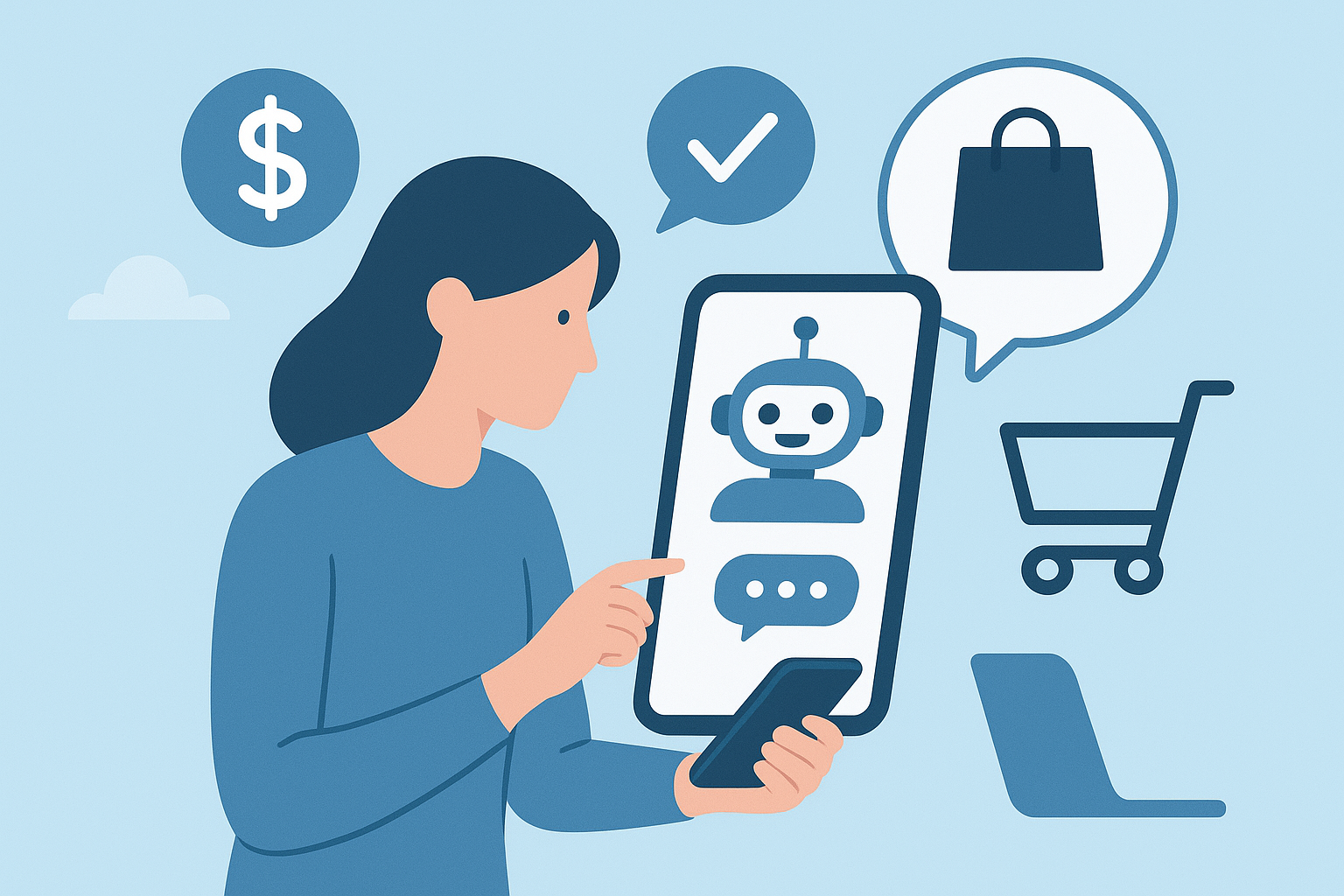In the rapidly evolving world of online retail, E-Commerce Chatbots have become the backbone of digital customer engagement. These intelligent assistants are reshaping how businesses interact with customers, offering real-time support, personalized shopping guidance, and 24/7 assistance that drives sales and brand loyalty. As consumer expectations continue to rise, implementing a well-designed chatbot strategy is no longer optional—it’s essential. This article explores how chatbots are transforming e-commerce and why adopting them can unlock your store’s true potential.
Introduction
In the age of instant gratification, customers expect immediate responses and seamless shopping experiences. Businesses that fail to meet these expectations risk losing potential buyers to competitors who offer faster and more engaging interactions. That’s where E-Commerce Chatbots step in—powerful AI-driven tools designed to enhance the shopping journey from discovery to checkout.
At EngagerBot, we understand the growing need for intelligent automation in e-commerce. Our goal is to help businesses integrate advanced chatbots that can handle inquiries, recommend products, and even assist with after-sales support. With chatbots becoming a major trend in digital retail, it’s time to explore how these virtual assistants are changing the face of online shopping forever.
The Rise of E-Commerce Chatbots
The digital marketplace has witnessed a tremendous shift in how brands communicate with customers. Gone are the days when email or phone support were the only options. Today, chatbots have taken center stage as the preferred medium of interaction. They not only respond instantly but also create a conversational environment that mirrors real human dialogue.
E-Commerce Chatbots are powered by Artificial Intelligence (AI) and Natural Language Processing (NLP), enabling them to understand customer intent, provide personalized product recommendations, and resolve common issues without human intervention. What makes them truly revolutionary is their ability to learn and adapt based on each customer’s behavior.
The adoption rate of chatbots has surged as e-commerce businesses realize their impact on conversion rates and customer retention. These AI assistants reduce cart abandonment, provide targeted offers, and deliver customer service round the clock—essentially becoming a 24/7 sales representative. As technology advances, chatbots will continue to evolve from simple Q&A tools to intelligent brand ambassadors capable of managing entire customer lifecycles.
Why E-Commerce Businesses Need Chatbots
Every successful e-commerce brand knows that customer experience drives sales. A chatbot bridges the gap between online convenience and personalized service by creating a shopping experience that feels both efficient and human.
With the volume of online shoppers increasing daily, human teams often struggle to keep up with inquiries, order tracking, and support requests. Chatbots eliminate these bottlenecks by offering instant assistance. They can guide customers through product selection, apply discount codes, or suggest complementary items—all while collecting valuable data about preferences and behaviors.
Moreover, integrating chatbots can drastically cut operational costs. Businesses can manage higher volumes of customer interactions without hiring extra staff. This efficiency translates to higher profit margins and better scalability. For startups and small businesses, a chatbot provides enterprise-level service quality at a fraction of the cost. In short, chatbots aren’t just a tech trend—they’re a strategic asset for any online retailer aiming for sustainable growth.
Enhancing Customer Engagement Through AI
Customer engagement is at the heart of every successful online store. Without interaction, even the best product may go unnoticed. AI-driven E-Commerce Chatbots transform passive visitors into active participants by initiating conversations and understanding their intent.
By leveraging advanced algorithms, chatbots can greet returning customers by name, recall past purchases, and suggest relevant items. This level of personalization fosters a stronger connection between the customer and the brand. When users feel recognized and valued, their likelihood of purchasing—and returning—increases significantly.
The psychological impact of instant communication should not be underestimated. Consumers feel more confident buying from a store that can answer their questions immediately. Chatbots make that possible, building trust and satisfaction while simultaneously driving revenue. Over time, these AI systems learn from every interaction, continuously improving their responses and understanding of customer needs.
Chatbots as the Future of E-Commerce Marketing
Marketing in e-commerce is becoming increasingly conversational. Instead of broadcasting one-way messages, brands are now engaging in two-way dialogues through chatbots. This new form of marketing allows for direct communication with potential buyers, making promotions more targeted and effective.
Chatbots can send reminders for abandoned carts, promote new collections, and notify customers about ongoing sales. Because they analyze behavioral data, they can tailor these messages to each individual, improving open and conversion rates. This hyper-personalized approach goes beyond traditional email or ad campaigns—it creates a sense of exclusivity and relevance.
As more customers shift to mobile shopping and social media, chatbots integrated into platforms like Facebook Messenger, Instagram, and WhatsApp allow businesses to reach audiences where they already spend their time. The future of e-commerce marketing lies in real-time conversational commerce, and chatbots are leading the way.
24/7 Customer Support and Instant Assistance
One of the most powerful advantages of e-commerce chatbots is their ability to provide round-the-clock customer support. In a global marketplace where customers shop from different time zones, providing 24/7 service is critical. Chatbots ensure that no query goes unanswered, no matter the hour.
These digital assistants can instantly address FAQs, assist with order tracking, handle refunds, and even escalate complex issues to human representatives when necessary. This hybrid support model creates a perfect balance between efficiency and empathy.
Instant responses not only improve satisfaction but also build trust. Customers know they can rely on your business to assist them anytime. Over time, this consistency strengthens brand reputation and loyalty. For modern e-commerce stores, chatbots have become indispensable tools that redefine customer service expectations.
Personalized Shopping Experiences
In the crowded e-commerce landscape, personalization is the ultimate differentiator. Shoppers expect brands to know their preferences, style, and budget. E-Commerce Chatbots make this possible by analyzing browsing patterns, purchase history, and real-time interactions.
These insights allow chatbots to act like virtual shopping assistants. For example, if a customer frequently buys athletic wear, the chatbot can recommend new arrivals in that category or notify them about limited-time discounts. This creates a curated experience that feels uniquely tailored to each user.
Personalization also boosts conversion rates by minimizing decision fatigue. Instead of browsing through hundreds of products, customers receive direct recommendations that match their needs. Over time, this builds emotional connections and fosters long-term brand loyalty. With AI and data analytics continuing to advance, the future of personalized e-commerce shopping looks more engaging than ever.
Integrating Chatbots with E-Commerce Platforms
Integrating chatbots with e-commerce platforms is one of the smartest moves an online business can make. Whether you’re using Shopify, WooCommerce, Magento, or BigCommerce, chatbots can seamlessly plug into these systems to enhance the shopping experience. When properly integrated, they can access real-time inventory, process orders, and provide tracking updates without requiring the customer to leave the chat window.
A well-integrated chatbot creates a unified ecosystem where communication, sales, and customer management happen simultaneously. This smooth workflow allows businesses to operate more efficiently, eliminating redundant processes. Chatbots can also connect to CRMs and marketing automation tools, ensuring that every customer interaction contributes to a larger data-driven strategy.
The future of E-Commerce Chatbots lies in full automation and intelligent integration. Imagine a chatbot that automatically updates customers about their order status, sends personalized thank-you messages after purchases, and even recommends future products based on shopping behavior. These capabilities create a truly cohesive and responsive digital store that feels alive 24/7. By merging AI-driven chat systems with existing e-commerce infrastructure, businesses can create an end-to-end experience that’s intuitive, efficient, and customer-focused.
How Chatbots Boost Conversions and Sales

The ultimate goal of every e-commerce store is to increase conversions and sales. Chatbots contribute to this goal by optimizing each stage of the buyer’s journey. From the moment a visitor lands on the website, a chatbot can engage them, answer questions, and recommend products—all actions that nudge potential buyers closer to making a purchase.
One of the key reasons chatbots drive conversions is their ability to reduce friction. Many shoppers abandon carts due to confusion or lack of information. Chatbots eliminate this by providing instant clarity, guiding customers through the checkout process, and addressing last-minute doubts. The result is fewer abandoned carts and higher completion rates.
Moreover, E-Commerce Chatbots are ideal for upselling and cross-selling. Based on a customer’s cart items or browsing behavior, they can suggest complementary products or upgrades that align with the shopper’s preferences. These contextual recommendations feel natural rather than intrusive, making the customer more receptive. Over time, chatbots become intelligent sales partners that proactively identify opportunities for increased revenue—making them invaluable for both small and large online businesses.
Chatbots and the Role of AI in Customer Analytics
Artificial Intelligence has transformed how businesses collect and interpret customer data. Chatbots play a vital role in this evolution by serving as both communicators and data collectors. Every interaction between a customer and a chatbot generates valuable insights about preferences, intent, and buying patterns.
Through AI-driven analytics, e-commerce owners can identify which products are in demand, what questions customers frequently ask, and which marketing campaigns yield the best results. These insights empower businesses to make informed decisions about inventory, pricing, and promotions.
Furthermore, E-Commerce Chatbots can use predictive analytics to anticipate customer needs. For example, if a customer frequently purchases skincare products, the chatbot might recommend a new moisturizer before the old one runs out. This proactive engagement not only improves customer satisfaction but also drives repeat purchases.
The integration of AI, NLP, and analytics transforms chatbots from simple response systems into intelligent business tools. They don’t just serve customers—they learn from them. This feedback loop continually enhances performance and enables businesses to stay one step ahead in an increasingly competitive digital landscape.
Multi-Language Support for Global E-Commerce
The e-commerce industry is no longer confined by geography. Customers shop from different corners of the world, speaking multiple languages. To cater to this diverse audience, E-Commerce Chatbots with multi-language support have become essential. These advanced systems can instantly switch between languages, ensuring smooth communication for every user, regardless of location.
By breaking language barriers, businesses can expand their global reach and tap into new markets. Customers feel more comfortable engaging with a chatbot that communicates in their native language, which enhances trust and reduces the likelihood of misunderstandings.
AI-powered chatbots can now detect language preferences automatically based on the user’s browser or region. This adaptability allows businesses to personalize interactions without any manual setup. The more natural and localized the conversation feels, the more likely a visitor is to convert into a buyer.
In essence, multi-language chatbot support democratizes e-commerce, enabling even small brands to compete on an international scale. As globalization continues, multilingual communication will no longer be an option—it will be a necessity for brands aiming for worldwide recognition.
Social Media Integration and Omnichannel Experience
Modern shoppers interact with brands across multiple touchpoints—social media, websites, and mobile apps. To maintain consistent engagement, E-Commerce Chatbots must operate seamlessly across these channels. Social media platforms like Facebook Messenger, WhatsApp, and Instagram now allow direct chatbot integration, giving businesses a unified communication strategy.
This omnichannel experience ensures that customers receive consistent service wherever they engage with your brand. Whether it’s answering questions on Instagram or tracking an order via WhatsApp, chatbots deliver quick and coherent responses that maintain customer satisfaction.
By integrating chatbots into social platforms, businesses can capitalize on impulse buying. When customers see an ad or a product post, they can immediately interact with a chatbot to inquire or purchase without leaving the platform. This reduces the number of clicks to checkout and increases conversion rates.
An omnichannel chatbot experience enhances brand visibility, streamlines communication, and ensures that no lead slips through the cracks. It’s not just about being present everywhere—it’s about being consistent everywhere, and chatbots make that possible.
Chatbots and Voice Commerce
The next evolution in digital retail lies in voice commerce, where customers shop using voice commands through devices like Amazon Alexa, Google Assistant, or Siri. Chatbots play a critical role in bridging traditional e-commerce and voice-based shopping experiences.
Voice-enabled chatbots are capable of understanding natural speech patterns and processing requests instantly. Customers can ask about products, place orders, or track deliveries using simple voice commands. This hands-free, frictionless experience caters to the growing demand for convenience among modern consumers.
Businesses that integrate voice-enabled E-Commerce Chatbots gain a competitive edge by aligning with future shopping trends. Voice commerce is expected to grow exponentially, and brands that prepare early will dominate the space.
Moreover, voice chatbots make e-commerce more inclusive. They help users with disabilities or those less comfortable typing to shop easily. As voice recognition technology advances, the synergy between chatbots and voice assistants will redefine how people interact with online stores. It’s not just a technological upgrade—it’s a complete reimagining of the digital shopping experience.
Building Customer Trust with Chatbots
Trust is the cornerstone of every successful e-commerce business. Without it, even the most advanced technology or attractive product catalog cannot ensure long-term success. E-Commerce Chatbots help build this trust by offering transparency, reliability, and consistency in every interaction.
When customers receive instant responses to their questions and accurate information about products, shipping, or returns, it fosters a sense of security. Chatbots never ignore queries, never delay replies, and never display frustration — traits that customers greatly value in their shopping experience.
Additionally, chatbots can provide real-time order tracking, verify payment updates, and share clear refund policies. These consistent, reliable updates reassure customers that your brand values their satisfaction.
Trust also grows through personalization. When a chatbot greets a returning customer by name, references their past purchases, or provides customized recommendations, it builds emotional connection and confidence. Over time, this leads to loyal customers who view your brand as a trusted companion in their online shopping journey. In essence, chatbots transform digital trust from a goal into a daily reality.
The Role of Chatbots in Reducing Cart Abandonment
Cart abandonment is one of the biggest challenges for online retailers. Studies show that nearly 70% of shoppers abandon their carts before completing a purchase. E-Commerce Chatbots have emerged as one of the most effective tools for addressing this issue head-on.
When a user hesitates at checkout, a chatbot can intervene with helpful suggestions or answers to common concerns, such as shipping costs, return policies, or payment options. By resolving doubts in real time, chatbots significantly reduce friction in the buying process.
Moreover, chatbots can send gentle reminders to users who leave items in their cart, re-engaging them through personalized follow-ups or exclusive discounts. These proactive messages encourage customers to return and complete their purchases, improving overall conversion rates.
By combining instant communication, smart automation, and behavioral insights, chatbots minimize the barriers that lead to cart abandonment. The result is a smoother checkout experience and a measurable boost in revenue — proving that sometimes, the smallest nudge makes the biggest difference.
Security and Privacy in E-Commerce Chatbots
Security and privacy are paramount in the digital age, especially when handling customer data. As chatbots engage with users, they often collect sensitive information such as contact details, addresses, and payment preferences. For this reason, implementing robust security protocols is essential.
Modern E-Commerce Chatbots employ encrypted communication channels, secure APIs, and strict authentication mechanisms to safeguard user data. They comply with international standards like GDPR and CCPA, ensuring that customers’ personal information remains confidential.
Moreover, transparency about data usage builds credibility. When customers are informed about how their data will be used — and that it’s protected — they’re more likely to trust the chatbot and engage openly.
Chatbots can also detect and alert businesses about suspicious activities or potential fraud attempts in real time, adding another layer of security to online transactions. In short, a secure chatbot doesn’t just protect users; it protects the brand’s reputation. For businesses aiming to establish long-term relationships with their audience, trust in data security is non-negotiable.
Future Trends in E-Commerce Chatbots

As technology evolves, E-Commerce Chatbots will continue to grow in intelligence, adaptability, and emotional awareness. Future chatbots will not only understand customer words but also their tone, mood, and intent — allowing them to provide more empathetic and personalized interactions.
Integration with Augmented Reality (AR) and Virtual Reality (VR) will transform how customers browse products online. Imagine a chatbot that helps you visualize how a piece of furniture fits in your room or how a watch looks on your wrist through AR-powered experiences.
AI advancements will also allow chatbots to become predictive rather than reactive. They’ll anticipate customer needs before the customer even expresses them. Combined with machine learning, this predictive power will enable brands to offer hyper-personalized promotions and support, making online shopping more intuitive than ever.
Ultimately, the future of e-commerce chatbots is bright, promising a world where digital interactions feel completely natural, human-like, and emotionally intelligent — a seamless bridge between technology and empathy.
How Small Businesses Benefit from Chatbot Technology
While large enterprises have long embraced chatbots, small and medium-sized businesses are now realizing their immense value. For startups and independent online stores, E-Commerce Chatbots act as cost-effective virtual assistants capable of handling multiple roles — from customer support to sales, marketing, and data collection.
Small businesses often lack the manpower to provide 24/7 customer service. Chatbots fill this gap effortlessly by offering around-the-clock engagement without additional overhead costs. They can answer FAQs, recommend products, and nurture leads automatically, freeing human staff to focus on strategic growth.
Another key advantage is scalability. As a small business expands, the chatbot can easily adapt to increasing customer volumes without requiring major infrastructure changes. This scalability allows smaller brands to compete with bigger players on equal footing.
By integrating a chatbot, small e-commerce stores not only save money but also enhance professionalism, ensuring that every visitor feels valued and supported. In a competitive market, automation becomes the great equalizer — and chatbots are the tool that makes it possible.
Measuring Chatbot Success: Analytics and ROI
To ensure that E-Commerce Chatbots deliver measurable results, businesses must track performance through detailed analytics. Metrics such as engagement rate, response time, lead generation, and conversion rate provide valuable insights into chatbot effectiveness.
Modern chatbot platforms include built-in analytics dashboards that help businesses monitor conversations, identify common issues, and refine scripts for better accuracy. These analytics also reveal user behavior trends, allowing continuous optimization of the chatbot’s tone and performance.
Return on Investment (ROI) can be calculated by comparing the chatbot’s operational cost with the revenue generated from increased sales or reduced customer support expenses. Over time, most businesses find that the ROI is substantial, often paying back the investment within months.
Analytics not only measure success but also uncover opportunities for improvement. By fine-tuning chatbot behavior based on data, e-commerce owners can create a continuously evolving assistant that becomes smarter and more effective over time — driving growth, engagement, and customer loyalty.
Conclusion
The digital landscape of e-commerce continues to evolve, and chatbots stand at the forefront of this transformation. From improving engagement to streamlining operations, E-Commerce Chatbots are redefining how businesses connect with their customers. Their impact extends far beyond automation — they build trust, provide personalization, and enhance the overall shopping experience.
At EngagerBot, our mission is to help online businesses harness the full potential of chatbot technology. We specialize in creating intelligent, responsive, and secure chatbot systems designed to elevate customer satisfaction and drive conversions. As the future of online shopping unfolds, brands that embrace this innovation will not just survive — they will thrive.
Chatbots are not merely a trend; they’re the foundation of a smarter, faster, and more customer-centric e-commerce world. The time to adopt them is now, and EngagerBot is here to make that transformation seamless.

